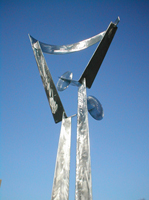
Bryn Mawr College

 |
Center Bryn Mawr College | 
|
February 27, 2003
Doug Blank (Computer Science)
Doug showed a series of graphs indicating that the number of women entering the field of computer science is falling nationwide. Women are vastly underrepresented in the field (the percentages are much lower than for other scientific and technical fields) and the numbers are not getting any better. Drawing on a new book called Unlocking the Clubhouse: Women and Computing, Doug traced a range of patterns of gender socialization which may contribute to women's disinclination to pursue computer science. In what ways do women differ from men, and how is that difference represented in such disinclinations? How much of a socioeconmic matrix is operating here? Is there a "digital divide" in families who invest in computers for their sons, not their daughters? Certainly any kind of economic disadvantage has a disproportionate effect on "women, minorities and persons with disabilities."
A study conducted at Carnegie Mellon computer science program and reported on in Unlocking the Clubhouse suggested that women, much more than men, are drawn into computer science because it is a broad, versatile field. But there are two primary disincentives for women to pursue the study of computer science: curricular design based on male preferences, and the macho--even hostile--environment for women students in computer science classrooms and labs. Women in the Carnegie Mellon study describe a "loss of confidence," a sense of being "outsiders," of not having made the right choices for themselves. There are many other ways to feel fulfilled than devoting oneself "singlemindedly" to a given profession, and women may be saying "no" to such a choice. It is not that they are not, or could not be, competent as computer scientists; it is rather that they decide that this is not what they want to be doing.
Anecdotes were shared about modeling classes in which colleagues discovered the "terrible disproportion" between the work put in and what was "got out" of it; computer programming may be unique in encouraging an obsession with tiny details--because they have macro effects. This may be one reason why computer science, as a field of study, selects for singlemindedness: an inordinate amount of time focused on details is required to produce very little output.
The demands for "singlemindedness" have symbolic value, and function as a way of demonstrating that one belongs to the club. It is a social requirement that one be perceived as devoting oneself to a single calling. But does one actually get better at computer science by doing only computer science (by "dreaming in code"), or by doing other things? And what is the definition of "better"? What "else" one does might include math and bio classes which will make one a better scientist after graduation, but not make any immediate contribution to demands that one produce a lot of code.
What can be done to address such concerns? Bryn Mawr faculty are thinking of new ways of making computer science a more inclusive field; these are not just gender issues, but attempts to open the field to everyone. A list of such suggestions--which include "humanizing" the discipline by incorporating stories of why others have chosen to engage in the field, and using computer science to provide services beyond the boundaries of the field itself, was provided.
But perhaps the problem that computer science faces is simply one that every new field goes through: an early period when it requires100% focus from its practitioners. One possible way to interpret the current culture of computer science, and its attendant failure to attract more women, is simply to call attention to the age of the field. Fewer women may be willing to put up with the demands (the "bullshit"?) that a new field requires; perhaps the field simply needs to mature before women can find themselves comfortable in it.
This conversation is invited to continue on the
On-Line Forum and will resume in person next Thursday, March 6, when Joseph Disponzio of the Bryn Mawr Cities Program will discuss "Changing Paradigms: Eighteenth-Century Natural Science and the Rise of Landscape Architecture." Colleagues may wish to look at his essay on this topic: "Jean-Marie Morel and the Invention of Landscape Architecture," in Tradition and Innovation in French Garden Art: Chapters of a new History, ed. John Dixon Hunt and
Michel Conan. Philadelphia: University of Pennsylvania Press, 2002.
Home
| Calendar | About
| Getting Involved
| Groups | Initiatives | Bryn Mawr Home | Serendip Home
Director: Liz McCormack -
emccorma@brynmawr.edu
| Faculty Steering Committee
| Secretary: Lisa Kolonay
© 1994-
, by Center for Science in Society, Bryn Mawr College and Serendip
Last Modified:
Wednesday, 02-May-2018 11:57:05 CDT